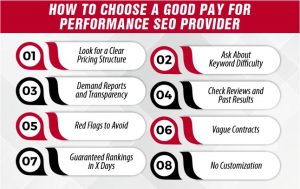Did you know that 68% of online experiences begin with a search engine, yet many businesses waste thousands on SEO that doesn’t bring results?
That’s the problem with traditional SEO—you pay every month, whether or not your site gets more traffic, leads, or sales.
At PhoenixDial, we’ve seen this happen far too often. That’s why our SEO model is simple: results first, payment second. Like we do for our BPO clients, we bring clarity, transparency, and performance to the front of every campaign.
This blog breaks down pay for performance SEO and how it helps you grow online without wasting your budget. Let’s dive into how this model works.
Start Growing Your Business Today
Get a free, personalized quote via WhatsApp for your business. No pressure—just smart solutions tailored to your goals.
What Is Pay for Performance SEO?
Pay for performance SEO is a simple idea—you only pay when you get real results. That means you don’t waste money hoping something works. You pay when your website ranks higher on search engines or when your traffic improves. It’s that straightforward.
In this model, the SEO agency and the business agree on goals ahead of time. These goals could include ranking on the first page of Google for specific keywords, increasing monthly site traffic, or getting more leads. Once those goals are met, you make the payment.
This setup is different from traditional SEO, where you pay a monthly fee no matter what. Performance-based SEO gives you more control and less risk. It’s also sometimes called pay on performance SEO, pay per result SEO, or seo pay for performance—but the idea is always the same: results first, payment second.
Let’s say you want your business to show up when someone searches “digital marketing services in [your city].” With a pay on results SEO model, you don’t pay until your site actually appears on that first page.
This approach makes sense for small businesses that want to invest wisely. You get to see progress, track it, and only pay when you win. That’s the power of pay-for-performance SEO services.
How It Works
Not all SEO plans are created equal—but pay for performance SEO keeps it simple and fair. You don’t pay just because someone is working on your site—you pay only when their work brings results.
Let’s break down how this model actually works, step by step.
Step-by-Step Overview
Keyword Research and Goal-Setting:
The first step in paying for performance SEO is choosing the right keywords. The SEO agency works with you to identify target keywords and set clear, measurable goals—like ranking on the first page of Google or increasing site traffic.
SEO Agency Works on Rankings/Content:
Once goals are set, the SEO agency gets to work. They optimize your website, improve content, and build backlinks, all aimed at hitting the agreed-upon targets.
You Pay Only After Goals Are Met:
You don’t pay until the SEO agency hits the targets they’ve set for your business. Whether it’s higher rankings or more traffic, you only pay when the results show up.
What Counts as a “Performance”?
In pay for performance SEO, performance means measurable results that directly benefit your business. Here are the key indicators of success:
Top 10 Rankings
Achieving a top 10 ranking on search engines for targeted keywords is one of the most common performance metrics. This means your website is visible to users who search for what you offer.
X% Traffic Increase
Another sign of success is a measurable increase in website traffic. For example, a X% increase in organic traffic within a specific time frame shows that your site is attracting more visitors.
Leads or Conversions
The ultimate performance indicator is leads or conversions. This could mean more sign-ups, product purchases, or contact form submissions—whichever aligns with your business goals.
When these targets are met, that’s when you pay for the performance SEO services. It’s all about real, tangible results.
Pros and Cons of Pay for Performance SEO
Like any strategy, pay-for-performance SEO has its advantages and potential drawbacks. It’s important to understand both sides before deciding if it’s the right choice for your business. Let’s take a look at the pros and cons.
Pros
This results-based model offers several benefits for growing businesses. It’s especially helpful if you want to reduce risk and focus on real outcomes.
Low Upfront Risk
With pay for performance SEO, you don’t have to pay large amounts before seeing any results. This lowers the financial risk, especially for new or small businesses.
More Accountability from the SEO Agency
Since agencies only get paid after meeting agreed-upon goals, they have a strong reason to deliver. It creates trust and ensures they stay focused on actual outcomes.
Great for Small Businesses with Tight Budgets
If your budget is limited, this model works well. It lets you invest in SEO without spending too much upfront. You pay only when your site ranks or traffic improves.
Clear and Measurable Goals
This model is based on defined results, like rankings, traffic, or leads. So you always know what to expect, and it’s easy to track success.
Motivates Better Strategy and Performance
SEO experts put more effort into what works. They focus on strategies that bring faster and real results because their payment depends on it.
Flexible and Performance-Driven
This model adapts to your business goals. Whether you want more leads, more traffic, or better keyword positions, it can be shaped around what you need.
Cons
While the model sounds appealing, it’s not perfect for everyone. There are a few things to consider before jumping in.
Some Agencies May Focus Only on “Easy-Win” Keywords
To get quick results, some providers may target low-competition keywords that don’t bring real value. These might boost rankings, but they won’t always attract the right traffic.
Long-Term Strategy May Be Ignored
Focusing too much on short-term goals can leave out important parts of a long-term plan. Good SEO takes time, and quick wins aren’t always sustainable.
Not All Niches Are a Good Fit
Some industries are highly competitive or very specific. In those cases, it may be harder to guarantee results or find an agency willing to take on the risk
Is It the Right Choice for You?
This model isn’t one-size-fits-all. Whether it’s a good fit depends on your goals, budget, and the kind of business you run.
Who Can Benefit Most?
Startups and local businesses often see the most value. If you’re working with a small budget and want to avoid upfront costs, this can be a smart move. It’s also great for marketers who want to test SEO without long-term contracts.
Who Should Think Twice?
Big brands with complex websites may need a more tailored and long-term strategy. Also, if you’re in a highly competitive niche, results can take longer, and some agencies might avoid working on tough keywords. In such cases, traditional SEO models might be more effective.

How to Choose a Good Pay for Performance SEO Provider
Not all providers are the same, so it’s important to choose wisely. Use this simple checklist to find a reliable partner who delivers real results.
Look for a Clear Pricing Structure
Make sure you understand how they charge. A good provider will explain when and why you’ll need to pay, based on rankings, traffic, or leads.
Ask About Keyword Difficulty
Some keywords are harder to rank than others. Ask if they consider this in their plan, so you’re not just getting results on easy or low-value terms.
Demand Reports and Transparency
You should always know what work is being done. Ask for regular updates and reports that show progress clearly.
Check Reviews and Past Results
Look at what others are saying. A provider with positive reviews and case studies is more likely to give you the results you want.
Red Flags to Avoid
Be careful—some providers may promise too much or hide important details. Here are warning signs you shouldn’t ignore.
Vague Contracts
If the agreement doesn’t clearly define what counts as “performance,” that’s a bad sign. Avoid contracts without specific goals, timelines, or pricing terms.
Guaranteed Rankings in X Days
No one can truly guarantee rankings in a set number of days. SEO takes time, and promises like these often mean risky or shady tactics.
No Customization
Every business is different. If the provider offers a one-size-fits-all plan without asking about your goals or market, they’re likely not focused on your success.
Conclusion
So here’s the deal—pay for performance SEO is all about paying for results. Sounds pretty sweet, right? You only pay when things actually improve, like better rankings or more traffic. That means less risk for you, especially if you’re on a tight budget.
But here’s the catch: it’s not for everyone. If you’re a big brand with a complex website or working in a super competitive niche, this might not be the best fit. You need to be clear about what you want from the start, so make sure to choose a provider that’s upfront and transparent.
Honestly, it’s a game-changer for smaller businesses or anyone who just wants to test the waters without the big upfront costs. But, like with anything, you have to pick the right provider, or else it’s a bit like buying something online without reading the reviews first.
Want to try something new and see real results? Pay for performance SEO might just be the thing you need to move forward without the usual risk.
FAQ’s
How do I know if Pay for Performance SEO is right for my business?
If you’re a small business or startup with a limited budget, this model can work great for you. It’s a risk-free way to get started with SEO. However, if your business is in a highly competitive market, you might need a more customized, long-term strategy.
How much does Pay for Performance SEO cost?
The cost depends on the goals set and the SEO provider you choose. Usually, it’s based on achieving specific milestones, such as ranking on the first page or increasing traffic by a certain percentage.
Can SEO agencies guarantee results?
Be cautious—no one can guarantee specific rankings or results in a set time frame. If an agency promises this, they might use questionable tactics. Look for agencies that provide realistic goals and transparent progress reports.
What happens if my website doesn’t meet the agreed-upon goals?
If the agency doesn’t hit the targets set, you typically don’t pay or pay less, depending on the agreement. It’s important to have clear terms outlined in your contract to avoid confusion.
How do I choose a good Pay for Performance SEO provider?
Look for agencies with clear pricing, proven past results, and transparent reporting. Avoid vague contracts or unrealistic promises of quick success. It’s always a good idea to check reviews and case studies.

